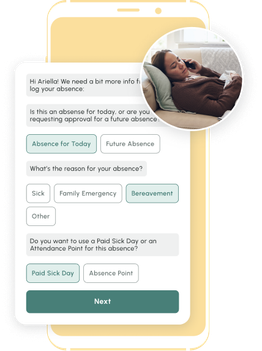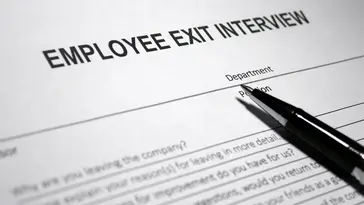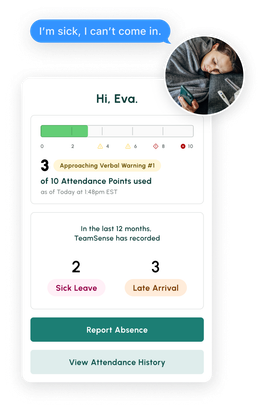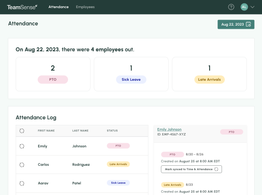Fix the root cause of No-Call No-Show with help from TeamSense
Table of Contents
- What Is an Employee Exit Interview?
- Why Are Employee Exit Interviews Important?
- When Should You Have an Employee Exit Interview?
- How to Conduct an Exit Interview
- Should Exit Interviews Be Confidential?
- Who Does an Employee Exit Interview?
- Different Ways To Hold An Exit Interview
- How To Put Together Questions To Ask During An Exit Interview
- Sample Employee Exit Interview Questions: What Should You Be Asking?
- General Questions To Ask During An Exit Interview
- How to Summarize Exit Interview Results
- How Can Exit Interviews Impact Employee Retention?
- Use Employee Exit Surveys To Your Advantage
50 Exit Interview Questions Along With How To Conduct One
When an employee leaves your company, the first question HR should be asking is why. Regardless if they're retiring, being terminated, quitting voluntarily, or moving on to a new opportunity within the organization - it's important to conduct an exit interview composed of questions that yield valuable insights and answer that all-important question: Why are they leaving? Or, in the case of termination or management exit, how can we prevent this from happening again in the future?
It’s no secret that rattling off question after question at an employee exit interview can be awkward—both for the HR manager and for the employee leaving the company. But with such a key opportunity to learn, it’s important that HR managers don’t let the moment pass them by or shove the responsibility onto someone else. Exit interviews are a “once an employee” type of moment that shouldn’t be thrown away.
They offer the opportunity for both parties to reflect on that specific employee's time at the company and gather crucial information that can be used for improvement in the future. When a thoughtful, well-planned out set of exit interview questions are presented to the exiting employee, it impacts the existing employee experience and boosts employee retention with learnings that can and do impact company policies, benefits, and management.
It's not always easy picking out the right questions, and it's definitely not a one-exit-interview-questionnaire fits-all situation either. Questions should be swapped in and out depending on the reason for the employee's departure as well as the employee's position within the company. That being said, we know how bogged down HR professionals are, so we've compiled a list of sample exit interview questions to help get you started on creating your own exit interview questionnaire.
Below you will find a breakdown of common exit situations, such as an intern deciding to take a position with another company, questions for a retiree on their tenor, for employees that voluntarily quit, and for management or leadership that's moving on. Before we get to the sample exit interview questions, we take a deep dive into why exit interviews are important, their impact, and what to take into consideration, as well as tips for conducting a successful exit interview.
What Is an Employee Exit Interview?
The classic exit interview happens when an employee has decided to quit and has given notice. It's a one-on-one meeting between the exiting employee and an HR manager, or leader. It’s a chance for HR to explain the separation agreement, go over any severance pay and unused sick time, and a time to ask questions about why they are leaving.
Exit interviews are famous for being awkward, impersonal, and a time for disgruntled employees to vent. But when done the right way, and by asking the right questions, exit interviews can be incredibly insightful in understanding what needs to change in your organization.
Why Are Employee Exit Interviews Important?
The exit interview is a goldmine of information that can unveil what your company culture is really like from your employee’s perspective. They can provide insight like where your company is missing the bar with employees or shed light on any managerial or team personnel issues that influence the employee experience.
When there is a problem between an employee and a manager that stems from the manager’s poor leadership or lack of empathy, upper management may never know until they ask the question during the offboarding process. Or, let's say the competitor down the street is offering better childcare benefits—your company might never know if it weren’t for the questions asked in employee exit interviews. To sum it up - an exit interview is a time to find out how big the gap is between what employees want and how things are running and what you are offering, and how management is conducting themselves.
When Should You Have an Employee Exit Interview?
An exit interview should happen every time there is a separation between an employee and an employer. The trick is to have the discussion after the heat of emotions leave and before the employee becomes disengaged. As the HR manager, you want the employee to answer the questions honestly and openly, so timing is key.
Depending on the exit, it may be best to wait a few weeks before scheduling an exit interview. In the case of termination or management exit, it’s important to have a neutral third party conduct the exit interview in order to maintain legal compliance and objectivity.
That said, you don’t have to have an employee exit interview before a team member heads out the door for good. Some companies even wait a few months post-employment to have the exit interview in a much more relaxed atmosphere. By this time, the employee has moved on and can answer the questions a little more objectively (and honestly). If you're confident the employee will remain receptive and willing to engage, then, a couple of weeks or months is fine.
If you feel like a particular employee exit interview is necessary, and the employee refuses to participate, document their refusal in writing.
How to Conduct an Exit Interview
How to conduct the exit interview is up to you and your company's protocol. You might want to have every employee's exit interview face-to-face to make it more personal. Or you might want to send a survey to the former team member once all the dust of their departure has settled. The choice is yours.
Should Exit Interviews Be Confidential?
Exit interviews should be kept confidential, but sharing high-level learnings with your leadership team is important. During the interview, let the employee know how you will share the exit interview results with the leadership.
Who Does an Employee Exit Interview?
While HR is typically responsible for conducting exit interviews, sometimes it may be someone else in a leadership role or management position. But, no matter who it is, the information still needs to be relayed to company leadership. This is essential so that they are clued in on the main causes of employee retention and turnover in their organization.

No one wants to talk to their boss or a 1-800 stranger to call off. Text changes everything - Reducing No Call No Shows.
Different Ways To Hold An Exit Interview
Face-to-face exit interviews give the departing employee a chance to truly express themselves, but some employees may feel intimidated or uncomfortable speaking with someone in person. Some prefer to conduct exit interviews over the phone or through a survey.
No matter how you choose to hold the exit interview, it’s important that the individual feels comfortable and open to being honest with their feedback. Here are some of your options for conducting an exit interview.
In-Person Meeting
Ah, yes, the standard in-person exit interview with HR is on an employee’s last day. This is probably what most people picture in their minds when they think about employee exit interviews, but this style is actually becoming less common nowadays.
In-person exit interviews are great for creating that personal touch and leaving things on a positive note with your soon-to-be former employee. But if things are ending on not-so-good terms, an in-person interview might pour salt into the wound.
Phone Call
Although this option is less personal than sitting knee cap to knee cap, a phone call can be a good option and may help an employee feel more at ease leading to more truthful results when it comes to answering questions. If you’re relying on a phone call, it likely means that some time has passed (which can be good if the parting wasn’t on good terms). Having an employee exit interview over the phone can give the former employee time to collect their thoughts and express them freely.
Online Survey
If you manage a large workforce or are dealing with a large amount of employee turnover, an online survey that can be done without hassle is ideal for employees. This is your best bet if you want to do the exit interview after an employee has already left the company. The easier they can access the questionnaire and the less time it takes out of their lives, the better. Having an exit interview take place through a survey means that you could get more honest answers too.

How To Put Together Questions To Ask During An Exit Interview
Now that we’ve covered the logistics, it’s time to dive into what exit interview questions you should ask. The main goal is to gather information on why employees are leaving your organization and how you can improve employee retention in the future. There are some universal questions that you can ask, but it’s also important to tailor exit interview questions to the specific position and individual.
To do this, you should be looking at each employee's unique situation. Consider things like their role, length of time in the company, and their exit reason (voluntary resignation, retirement, termination, etc.). We recommend creating templates for the most common exit reasons and tailoring questions based on each individual exit interview.
Sample Employee Exit Interview Questions: What Should You Be Asking?
Even though exit interviews can feel a bit cold, when the right questions are asked, you can learn some valuable information and end the employee’s experience on a positive note. The way employees act when they leave a company says a lot about them. But how the company acts toward a departing employee also says a lot about the company. It’s your final chance to leave them with a good impression of the company. Let these questions help guide the conversation.
General Questions To Ask During An Exit Interview
The questions below are more of a "one-type" fits all kind of exit interview. These questions can be asked during any exit interview regardless of the circumstances surrounding their departure from the company. Further down, we will get more specific with the questions based on the nature of the exit.
- Why did you decide to part ways with [company]?
- What made you start looking for employment elsewhere?
- Was there an incident that finalized your decision to resign? If so, what?
- What does your new position offer that's not available in your current role?
- Could anything have been done to keep you with the organization? If so, what?
- Did you speak with anyone prior to making the decision to resign?
- Would you return to the organization? Why or Why not?
- Would you recommend the organization for employment to others? If not, why?
- Did you ever feel bullied or harassed in any way? If yes, did you reach out to HR?
- Was your leadership engaging or supportive during your employment?
- Did you have adequate tools, resources, and/or training to fulfill the requirements of your role? If not, what was lacking?
- Do you have any recommendations to make the organization more appealing?
- Is there anything else you'd like to add?
- Is it okay if a member of our Human Resources department contacts you to ask any follow-up questions?

Is your call-in process terrible? Text reduces no-shows and absenteeism by up to 40%.
Don't believe us? Check out this case study to see how this 3PL benefited.
Questions To Ask When An Employee Retires
Retirement is a bittersweet moment. It means they are leaving the workforce they know and love, but it also can mean more free time and new adventures. Asking the following questions during an exit interview with a retiring employee will help you understand their career journey and where they plan to go from here.
- How do you feel about your career and accomplishments at the organization?
- What do you plan to do in retirement?
- Do you feel like you have enough resources for retirement?
- Did the organization provide sufficient training and support throughout your career?
- Is there anything that could have been done to make your experience more positive or successful?
- Do you have any advice for current or future employees at the organization?
- Are there any changes you'd like to see in the company's retirement program or benefits?
- Do you plan to stay involved with the organization in any way, such as through volunteering or consulting?
Questions To Ask When An Employee Has Been Terminated
Termination is never an easy subject to broach, but exit interviews are still important in this instance. Sometimes the termination can be amicable. Other times it may not be. Asking the following questions during a terminated employee’s exit interview will help gather information on how they perceive the organization and hopefully improve any policies or procedures that may have led to their termination.
- Can you explain the events leading up to your termination?
- Were there any warning signs or red flags prior to being terminated?
- Did you receive proper training and support in your role, leading up to the termination?
- Did you feel like management was supportive of your performance in the role?
- Do you have any recommendations for the company or your former team to prevent similar situations in the future?
- Is there anything else you’d like to add about your experience at the organization and/or your termination?
Questions To Ask When An Employee Voluntarily Resigns
Voluntary resignations can happen for a range of reasons, from personal to professional. Asking the following questions during an exit interview with a voluntarily resigning employee will help gather information on their experience at the organization and hopefully improve any policies or procedures that may have led to their decision to leave.
- Why did you decide to resign from your position?
- Was there any way the organization could have prevented your resignation?
- Did you feel like you received proper training and support in your role?
- Were there any communication issues with management or coworkers that played a role in your decision to resign?
- Do you have any suggestions for improvement in the company culture or work environment?
- Would you recommend the organization as a good place to work?
- Is there anything else you’d like to add about your experience at the organization and/or your resignation?

Save Hundreds of Hours A Year With TeamSense
See how TeamSense saved HelloFresh 3-4 hours per day managing attendance through text. Read the case study and book your demo today!
Questions To Ask When A Manager Leaves The Company
When a manager leaves the company, it can have ripple effects throughout the entire team. Asking the following questions during an exit interview with a departing manager will help gather information on their experience at the organization and hopefully improve any policies or procedures that may have led to their departure.
- How would you describe your experience as a manager at the organization?
- Did you receive proper training and support in your managerial role?
- Were there any communication issues with upper management or coworkers that played a role in your departure?
- Do you have any suggestions for improvement in the company culture or work environment for managers?
- Were there any changes you’d like to see implemented in the managerial training program?
- Is there anything else you’d like to add about your experience as a manager at the organization and/or your departure?
Questions To Ask When An Intern Leaves The Company
Exit interviews with interns can provide valuable insight into the effectiveness of the intern program as well as how well they were integrated into the organization. Asking the following questions during an exit interview with a departing intern will help gather information on their experience at the organization and hopefully improve any policies or procedures for future intern hires.
- How would you describe your experience as an intern at the organization?
- Did you feel like you received proper training and support in your role?
- Were there any communication issues with managers or coworkers that played a role in your departure from the internship program?
- Do you have any suggestions for improvement in the intern program or work environment for interns?
- Would you recommend the organization as a good place for future interns to gain experience?
- Is there anything else you’d like to add about your experience as an intern at the organization and/or your departure from the program?
- Overall, would you say that your time as an intern at the organization was valuable and informative for your personal and professional development?
- Would you consider applying for a full-time position at the organization in the future? Why or why not?
How to Summarize Exit Interview Results
After conducting an employee exit interview, you’ll have a lot of useful information on your hands. And after all those exit interview questions have been asked of the exiting employee, you have one question left to ask yourself—What do I do with all this information?
Too many times, companies file it away and do nothing with the insights they just learned. In fact, 37% of HR managers say they rarely use exit interview data.# Don’t let that happen to you. Here’s how to summarize exit interview results.
- Track data points.
- Look for common themes that pop up.
- Schedule a quarterly meeting to share exit interview data with decision-makers.
For retention purposes, it’s essential that HR managers reveal this information to those in leadership who need to know. If you’ve had 50 mention working conditions and benefits as the reason they’re leaving your company—you need to look into that to reduce your turnover rate.
How Can Exit Interviews Impact Employee Retention?
Employee engagement is a leading factor in employee retention. But exit interviews will only impact employee retention when the learnings are taken to heart and used in ways that positively impact the rest of your employees.
It's estimated that 85% of employees aren't engaged at work.1 Even though that number can be hard to take in, there are still things you can do to turn the tide. Here are three factors that have a strong influence on employee engagement:
- an employee's relationship with their supervisor
- an employee's trust in the company's leadership
- an employee's pride in being part of the team
When preparing for the exit interview, keep these areas in mind and ask questions with the intent to learn how you can improve relationships, trust, and pride in your organization.
Use Employee Exit Surveys To Your Advantage
Exit interviews can tell you a lot. Don’t blow your shot to learn by not using employee exit surveys. You can use employee surveys anytime—not just when an employee is leaving—but they are even more essential when someone is on their way out the door. Listening to feedback matters—71% of employees say they are more effective at their job when they feel heard.2
And when an employee is exiting your company, it’s one of the final times you can get their take on things. Don’t miss your chance to learn from them and use that healthy feedback to improve the work environment for your team.
Remember, the main goal for exit interviews is to take action with the information you’ve learned to build a better workplace culture for your existing and future team. Use every employee departure as a chance to make your company 1% better.

The Future of Employee Management Is Here
(And it’s a lot simpler than you think). Get employee attendance, communication, engagement, and productivity all delivered over text.
About the Author

Sheila Stafford, CEO of TeamSense & AI in HR Innovator
As CEO of TeamSense, Sheila Stafford is at the forefront of transforming HR for frontline teams through AI-driven solutions. With a commitment to enhancing employee relations and simplifying workforce management, Sheila leads TeamSense in pioneering advancements that empower both frontline employees and HR teams. Her visionary approach combines cutting-edge technology with a thoughtful focus on enhancing human connection; Sheila strategically implements AI where it adds the most value while recognizing the critical role of personal interaction and ensuring that human engagement remains central when it matters most. Under her leadership, TeamSense is redefining how companies support and engage their frontline teams for a more connected, efficient workplace.





